Courts in the Balkans usually side with mothers in child custody cases. Now some fathers are fighting the system. Kids are caught in the crossfire.
The divorce was scrappy but the battle lines were clear. He wanted unfettered access to his two-year-old son, who lived with his ex-wife 10 minutes away by foot in the central Bosnian city of Zenica. She wanted him out of the boy’s life entirely. In the end, they begrudgingly agreed a compromise: the father would see the boy for four hours every Wednesday and two full days every second weekend. But soon, the boy’s mother started reneging on the deal, according to the father who declined to be identified. Despite the proximity of their apartments, he often waited weeks to see his son.
“It was especially difficult when I’d take him back to his mother … and he would cry and say, ‘Daddy, don’t go,’” said the father, 35, who is unemployed. “Then two months ago, she started to coach him.” He used a cell phone to record a video in which the boy is seen sitting on a plastic tricycle with a smile on his face, saying in a sing-song voice, “I don’t want to go to Daddy, I don’t want to go to Daddy.’” In the recording, the father is heard asking: “Who told you to say that?” “Mama did,” the boy replies.
In his view, this was a classic case of Malicious Parent Syndrome, a pattern of behaviour described by psychologists in which one parent tries to turn a child against the other after a hostile breakup. It was not possible to contact the mother to hear her side of the story. In a country where family courts do not recognise joint custody of children as an option, the father says he is trying to get social workers to intervene to make sure he can see his son — though he says what he really needs is a legal remedy.
“What I want most is equal or joint custody like in the West, but that could only happen if the system were changed,” he said. “Now I’m trying to get as much time as I can and I’d be so happy if I could get every weekend with my son.”
“They left without warning, without an explanation or a message or anything”
The man is one of thousands of fathers in Bosnia and neighbouring countries who fathers’ rights groups say have been cut out of big parts of their children’s lives after acrimonious split-ups. Mothers tend to get sole custody almost by default, say activists, lawyers and child welfare experts, blaming a traditional mindset that views women as best suited to parenting. They also say social services are often stretched too thinly to fully probe the circumstances of individual cases.
But some fathers are fighting back, arguing that sole custody hurts children and infringes on rights enshrined in European law and international conventions. “For me, the only acceptable thing was to continue to fight, to find out where they are and to somehow reach the children and contact them,” said Samir, a father in Sarajevo who asked to be identified only by his first name.
Samir has not seen his 13-year-old son and eight-year-old daughter for five years. After his divorce in 2009, he says his ex-wife started thwarting his court-approved visits with his son: two hours during the week and the whole of every second weekend. Nothing was set in stone for his daughter due to her age at the time; Bosnian courts only arbitrate on visits with children over the age of three. “She [his former wife] was always finding a way, saying the boy had homework, he was ‘sick’ or he was busy playing,” he said. “Then she started saying he didn’t want to see me, but I was never sure what was true because I only had her words to go by.”
Then one day in May 2012, he rang the doorbell of his ex-wife’s apartment. No one answered. He called the police, who discovered the property had been vacated. It turned out she had whisked the kids away to Sweden, where she has citizenship dating back to her years as a refugee from Bosnia’s 1992-1995 conflict. “They left without warning, without an explanation or a message or anything,” he said. “It was as if they simply disappeared.”
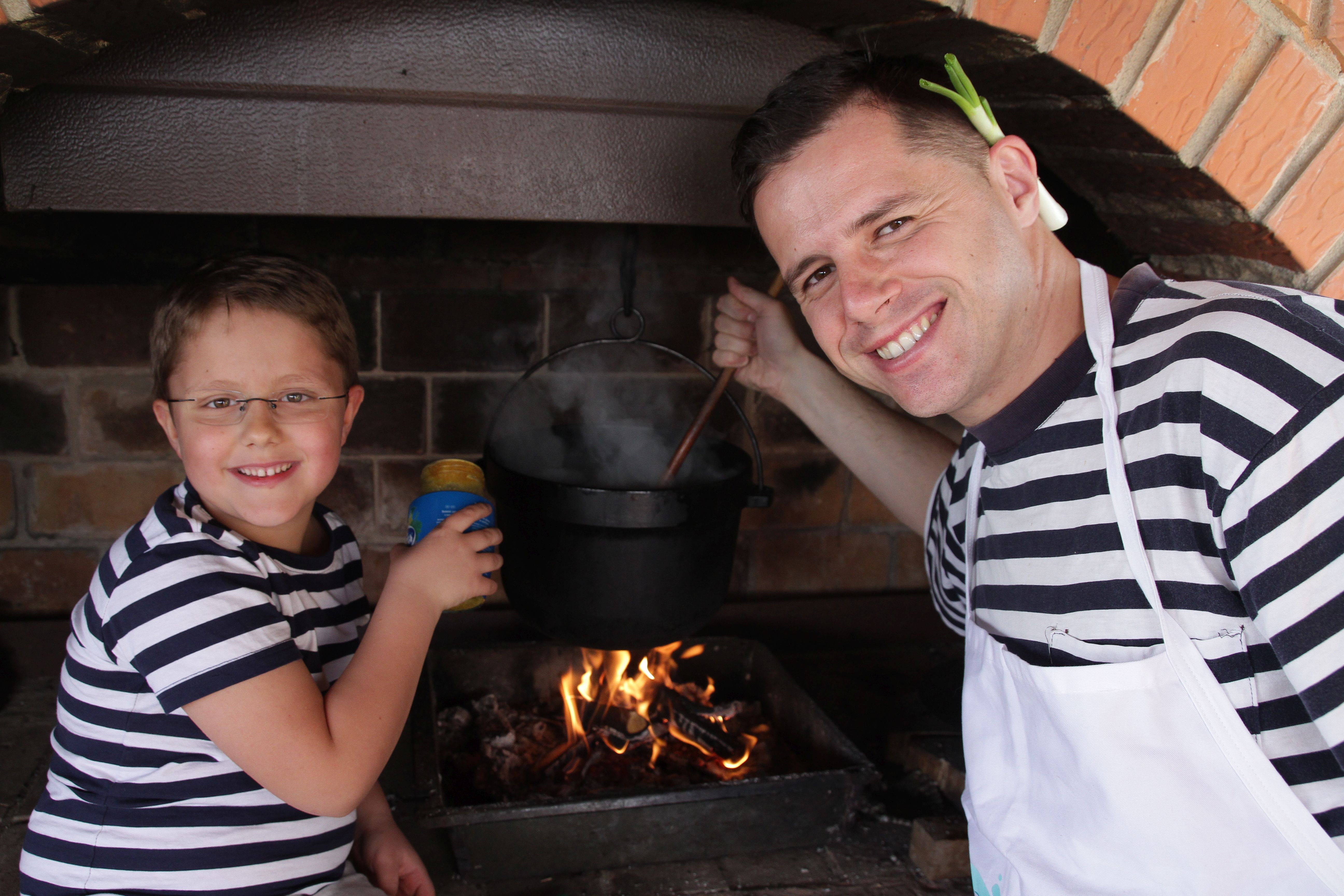
A father and son pose for the camera as they tend a barbecue. Like the image above, this photo was part of an exhibition and campaign organised by aid group Care International to encourage Bosnian fathers to play a more active parenting role. Photo: Care International
A father and son pose for the camera as they tend a barbecue.
This photo was part of an exhibition and campaign organised by aid group Care International to encourage Bosnian fathers to play a more active parenting role.
Photo: Care International
No joint custody
In fiercely macho Bosnia, it comes as no surprise that social workers find many fathers unfit for parenting. The country’s Agency for Gender Equality estimated in 2015 that one in five families had experienced domestic violence. In most cases, the perpetrators are men. But psychologists say some centres for social work have failed to adapt to changes in society, with more and more men defying macho stereotypes to assume the mantle of caregivers.
Whatever the broader changes in society, fathers are overwhelmingly the losers when it comes to child custody, according to data from the statistics bureaus of Bosnia’s two ethnic entities, the Muslim-Croat Federation of Bosnia and Herzegovina and the Serb-dominated Republika Srpska. Across both entities in 2016, mothers got custody in 77 per cent of divorces involving couples with children. Most of those decisions were made by family courts acting on the advice of social workers who interview parents and occasionally recommend psychological testing. In six per cent of divorces involving children, parents came to some kind of informal agreement on shared custody, data from the statistics bureaus showed.
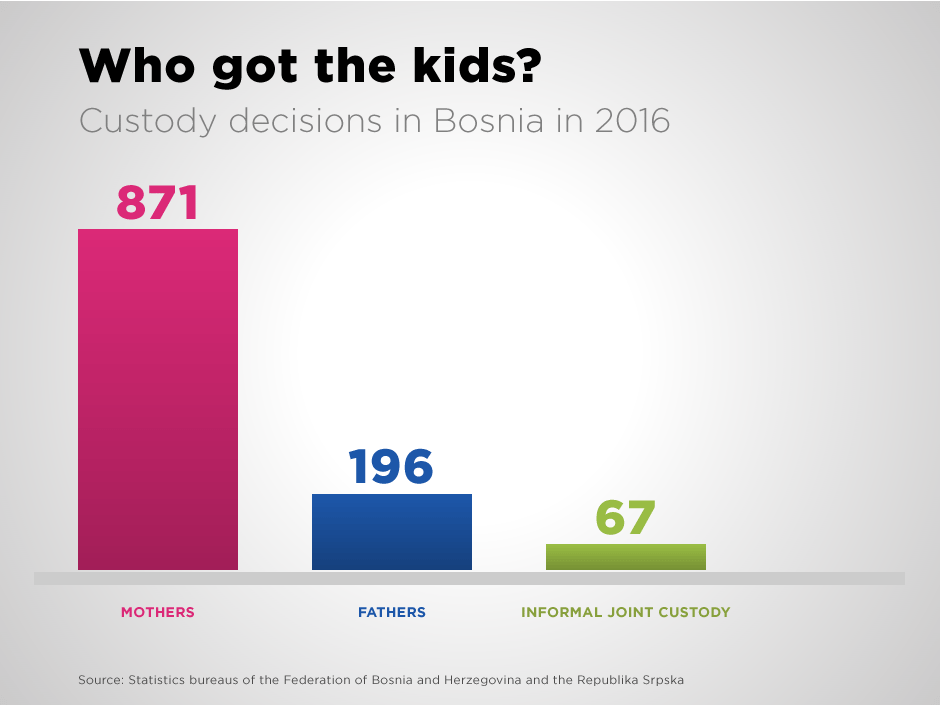
Who-got-the-kids infografic
Unlike in many European countries, Bosnian family law does not formally recognise joint custody, which allows mothers and fathers to share responsibility for childcare and parental decisions. “When it comes to joint custody, I’d be very careful with that,” said Aleksandra Marin-Diklic, head of the department for protection of children’s rights at Bosnia’s human rights ombudsman. “We don’t have a particular position, but as an institution, if we got involved in the issue, we would certainly ask the opinion of academics, family law professionals and certainly those directly involved in working with the people, namely staff of the centre for social work.”
“A child needs both mother and father”
Child psychologists say authorities may mean well but are sometimes ill-informed when it comes to deciding what is best for children. “Some ‘experts’ ask me if it’s good for a child to have two families, as they believe a child should have only one family from which to explore the world,” said Gordana Buljan Flander, a psychologist and director of a children’s welfare clinic in Zagreb, who often lectures in Sarajevo. “The best interest of a child after parents decide to divorce is to have, as much as possible, as equally as possible, both parents, even if they’re not perfect. When we talk about the rights of a child, a child has the right to family. When we talk about the needs of a child, a child needs both mother and father.”
Jasna Bajraktarevic, a prominent Sarajevo-based psychologist, agreed. “Children absolutely need both parents,” she said. “We shouldn’t be thinking in terms of what fathers can do or what mothers can do, but for sure, children need both parents, regardless of whether they make a family or are divorced.”
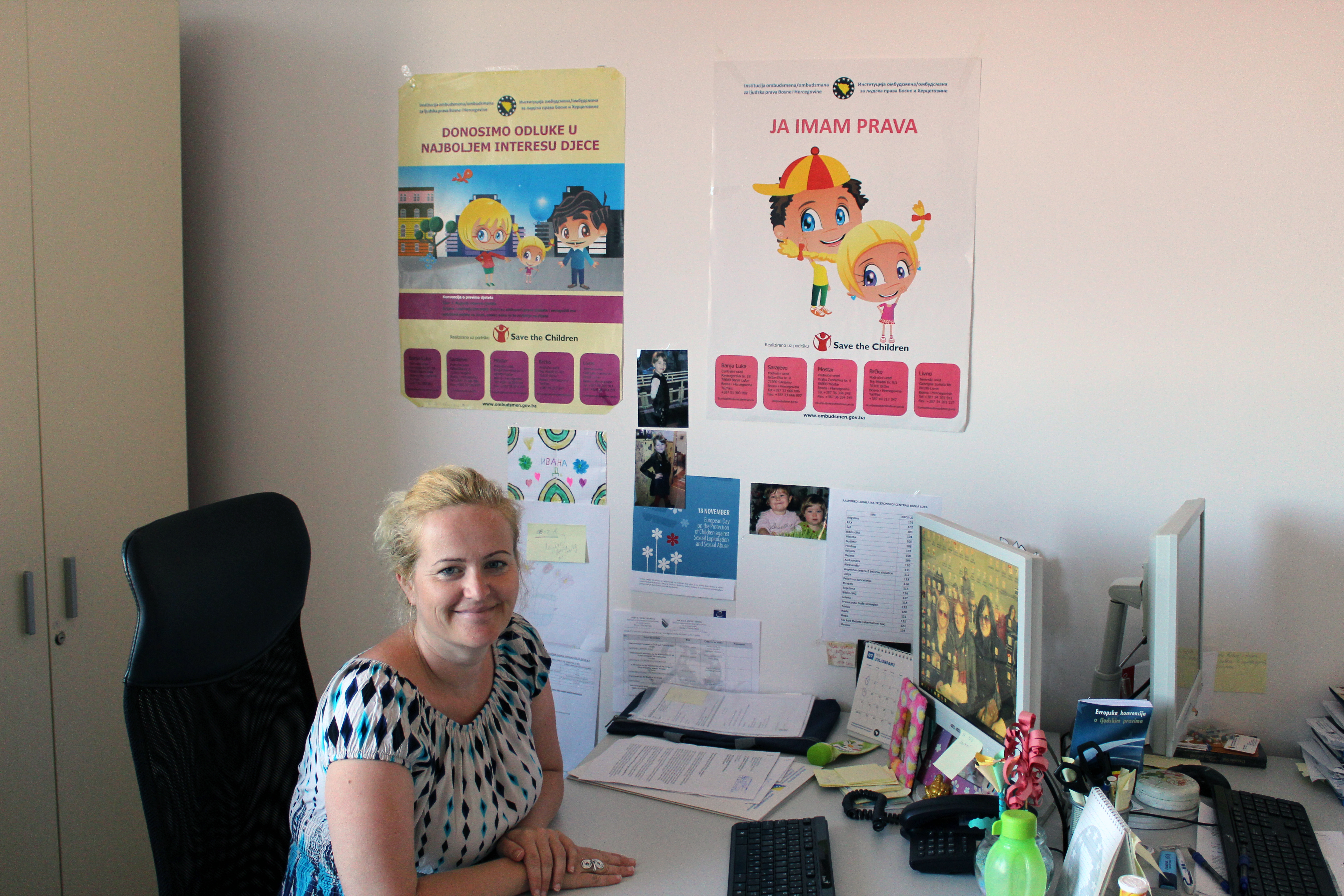
Aleksandra Marin-Diklic, head of children’s rights at Bosnia’s ombudsman, sits at her desk under posters reading “We make decisions in the best interest of children” and “I have rights”. Photo: Zdravko Ljubas
Aleksandra Marin-Diklic, head of children’s rights at Bosnia’s ombudsman, sits at her desk under posters reading “We make decisions in the best interest of children” and “I have rights”.
Photo: Zdravko Ljubas
‘Children suffer most’
In 1993, Bosnia ratified the UN Convention on the Rights of the Child, which states that children whose parents do not live together have the right to stay in contact with both parents, unless it might hurt them. The parliamentary assembly of the Council of Europe, which upholds human rights and the rule of law across 47 member states including Bosnia, passed a resolution in 2015 on fathers’ rights. Resolution 2079 calls on countries to guarantee “each parent the right to be informed and to have a say in important decisions affecting their child’s life and development, in the best interests of the child”. It also requires states to “introduce into their laws the principle of shared residence following a separation” and to “respect the right of children to be heard in all matters that affect them”.
The father in Zenica who is fighting for more time with his son said international instruments like these did little to sway social workers when he made his case for shared custody. “I argued that such practice is usual in normal European states that pay attention to human rights,” he said. “They stopped me right there, saying it would be impossible, so that was that.”
“They stopped me right there, saying it would be impossible”
Asked if social workers tended to favour mothers in custody disputes, Adnan Podzo, director of the Cantonal Social Protection Centre in Sarajevo, said simply: “The decision on who gets custody is made by the court, based on recommendations by the Social Protection Centre.” In 2016, the department for the protection of children’s rights at Bosnia’s ombudsman received 139 complaints, mostly related to rancorous divorces, according to the ombudsman’s latest annual report.
Many accused social workers of being biased, taking too long or failing to take into account the specific circumstances of individual cases, according to department head Marin-Diklic. “In most cases, children’s rights are infringed upon by the parents, but also by the slowness and inefficiency of the system,” she said. “In the end, children always suffer the most.”
Double standards
Fathers express similar resentments in other former Yugoslav republics with similar language and culture: Croatia, Montenegro and Serbia. In Croatia, the EU’s newest member, family law allows joint custody — but courts still tend to favour mothers as sole custodians. Between November 2013 and November 2014, the latest period for which data is available, 86 per cent of children in Croatia whose parents got divorced ended up with their mothers, according to the state statistics bureau. Just over three per cent ended up in the custody of both parents.
“My experience with the social protection service and the court [in Croatia] is such that I wouldn’t wish it on even my worst enemy,” said Oliver Canic, founder of a fathers’ group in Zagreb called the Association for Equal Parenthood. Canic said custody decisions were full of double standards. “If fathers have jobs, they’re often deemed too busy to look after children,” he said. “If they’re unemployed, they’re not seen as stable providers.”
Meanwhile, mothers with jobs are often not penalised while those who are unemployed are seen as having plenty of time for kids, he said. Under existing family law, joint custody is only possible if both parents agree to it. The Association for Equal Parenthood is proposing changes to the legislation so courts can grant shared custody based on a request from just one parent.
“I wouldn’t wish it on even my worst enemy”
Psycho-sociologist Bruno Simlesa said the problem boils down to deep-seated attitudes toward gender roles. “The prevailing opinion in Croatia, but also other countries in this region, is that caring for children is emasculating,” he said. “People believe that real men don’t go to their kid’s school recital. Real men earn money and discipline their kids when needed.”
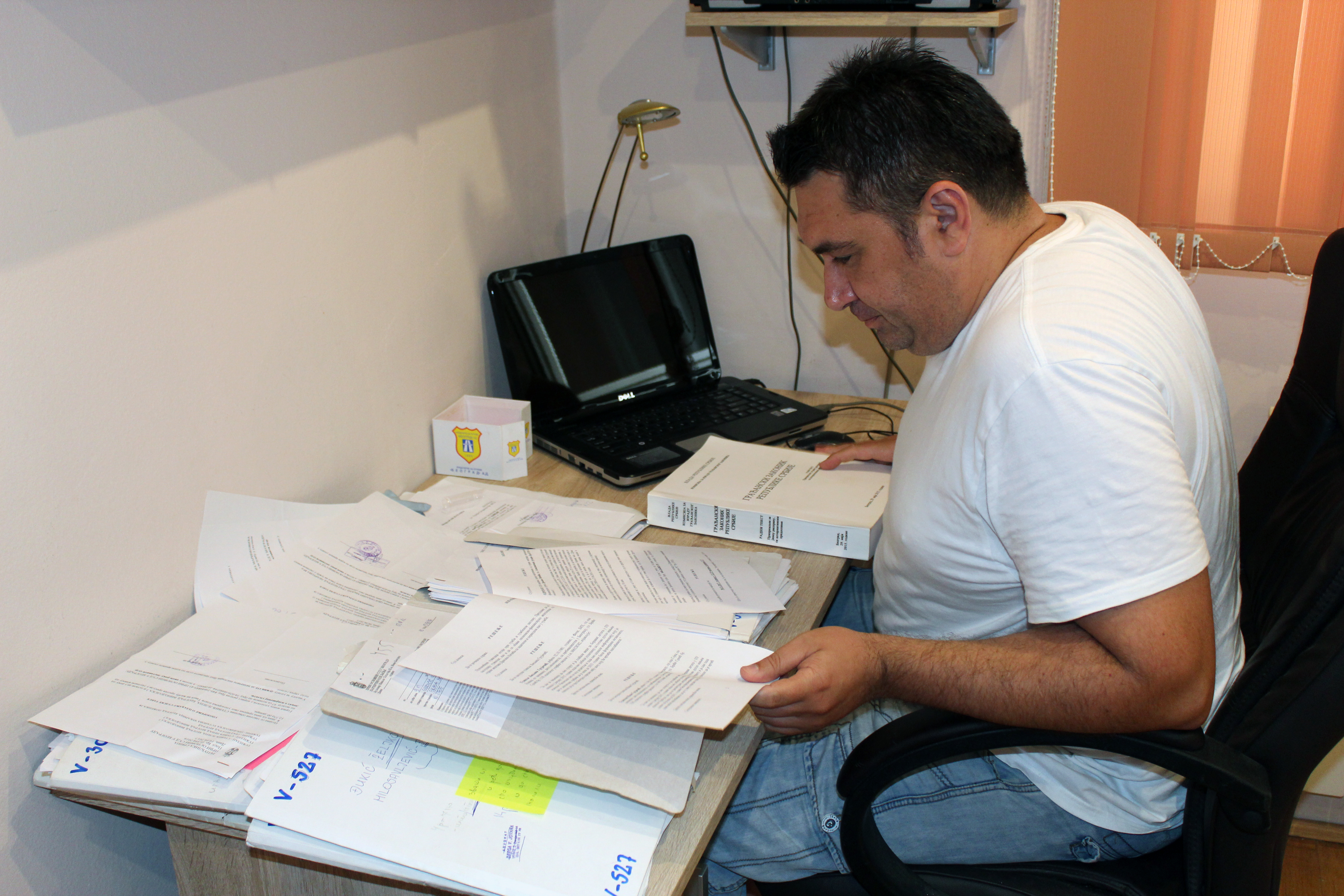
Dejan Visekruna, founder of the Tata association, pours over papers at his office in Belgrade. On his desk is a 468-page set of recommendations for reforming Serbian family law. Photo: Zdravko Ljubas
Dejan Visekruna, founder of the Tata association, pours over papers at his office in Belgrade. On his desk is a 468-page set of recommendations for reforming Serbian family law.
Photo: Zdravko Ljubas
Scandinavian model
In Montenegro, children went to mothers in 80 per cent of divorces in 2016, data from the statistics bureau showed. That compared with around seven per cent who went to fathers and a similar proportion who ended up in joint custody, which Montenegrin law allows for. Serbian family law also recognises joint custody, though courts rarely grant it. Serbia has no central data source on divorce cases, but research into court rulings by a Belgrade-based fathers’ rights group called Tata suggests that mothers get custody in up to 95 per cent of acrimonious divorces.
“As a society, we simply believe that the mother is the parent in charge of raising children,” said Tata founder Dejan Visekruna, adding that most people see the role of fathers as limited to spending some time with kids and paying alimony. At the Tata office in central Belgrade, Visekruna’s phone rang repeatedly. Fathers were calling for legal advice, to book appointments or simply to let off steam.
Visekruna, a 45-year-old former physician who has experience fighting for custody of his own son, offered reassurance and practical advice. On his desk was a cup bearing the names of children whom Tata fathers are fighting for. Working with lawyers, Tata has come up with a 468-page set of recommendations for reforming Serbian family law, including ways to make the custody process more efficient and equitable.
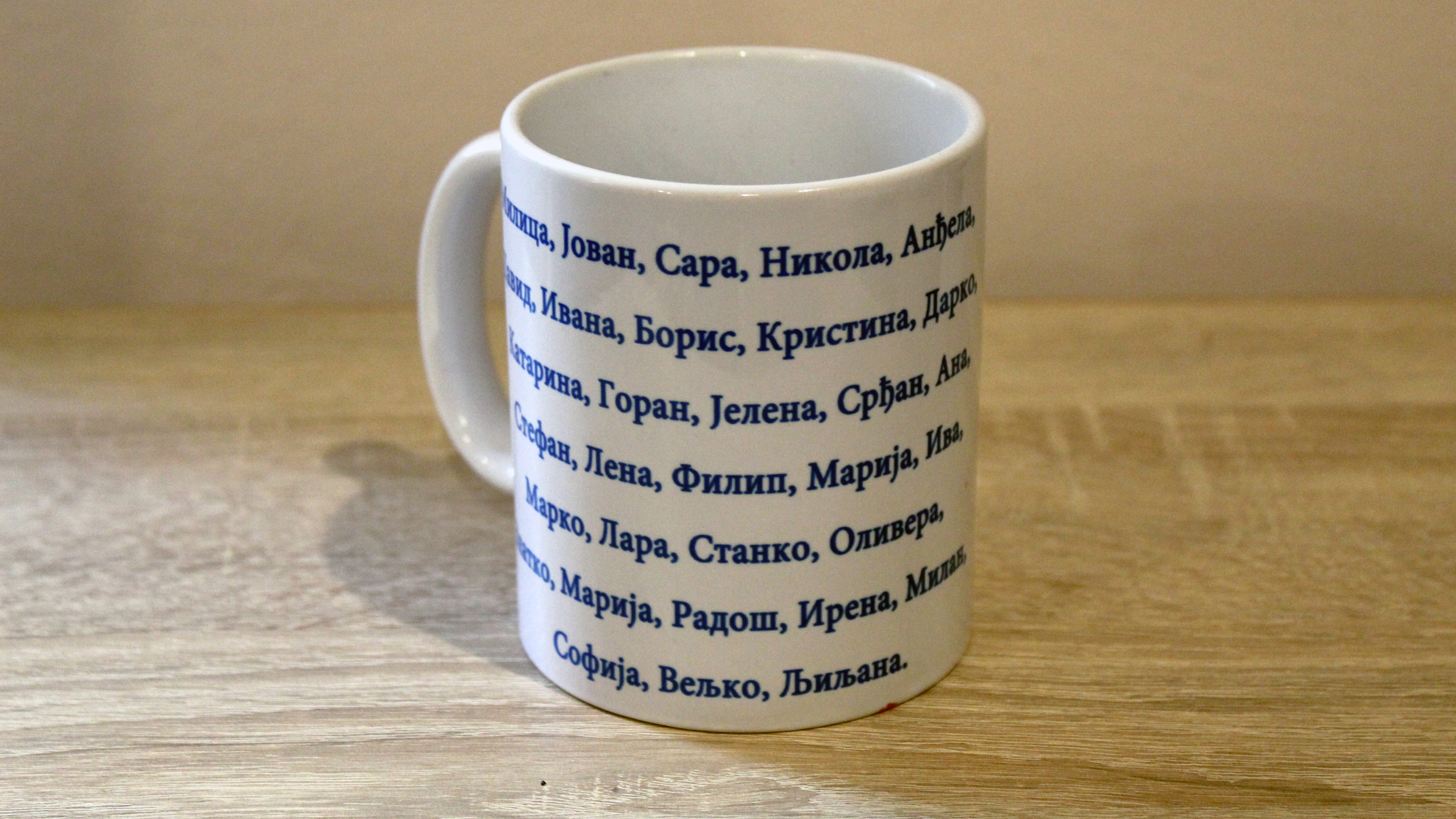
Jovan, Sara, Nikola, Ivana, Goran, Filip, Marija… Names of children involved in custody disputes adorn a cup at the Tata office in Belgrade. Photo: Zdravko Ljubas
Jovan, Sara, Nikola, Ivana, Goran, Filip, Marija…
Names of children involved in custody disputes adorn a cup at the Tata office in Belgrade.
Foto: Zdravko Ljubas
“Scandinavia has a different approach,” he said. “The basic system there is that children spend one week with mother, one week with father … Swedes started it in the ‘80s, through the emancipation of women in society. “At some point, with the development of gender issues, they decided everyone should be equal, so they equalised the position of men and women in divorces, giving them the same rights and obligations, even over custody of children.”
Bosnia has no fathers’ organisation equivalent to Tata in Belgrade or the Association for Equal Parenthood in Zagreb. Which leaves Samir, whose former wife took his children to Sweden, with little support as he reconciles himself to life without his kids. “I love my children whether they are with their mother or with me,” he said. “I wish them all the best, as every parent would, but the fact that they are not with me is not my decision.”
First published on 28 December 2017 on Balkaninsight.com.
This text is protected by copyright: © . If you are interested in republication, please contact the editorial team.
Copyright information on pictures, graphics and videos are noted directly at the illustrations. Cover picture: Photo: © Care International
This article was produced as part of the Balkan Fellowship for Journalistic Excellence, supported by the ERSTE Foundation and Open Society Foundations, in cooperation with the Balkan Investigative Reporting Network.